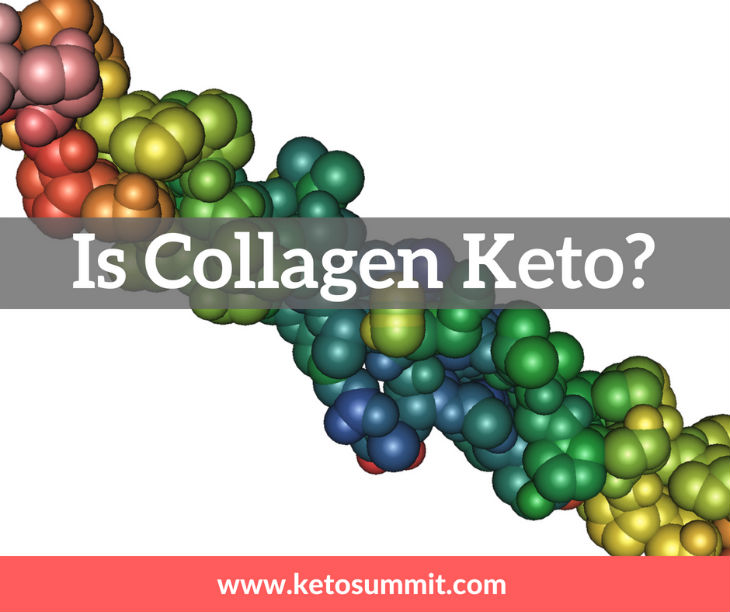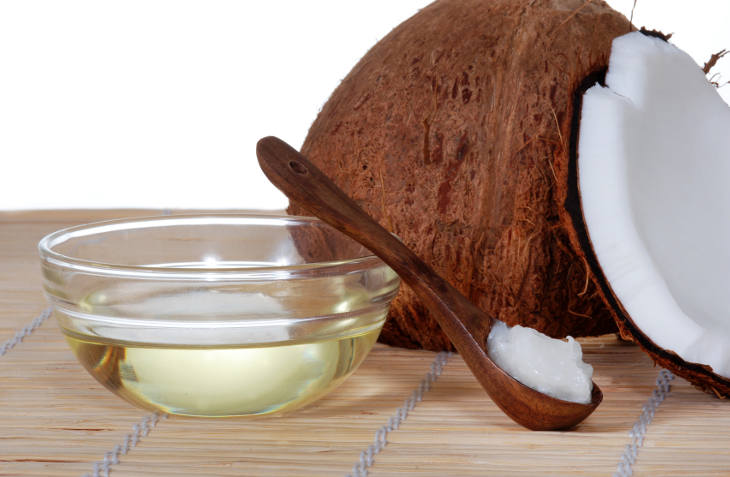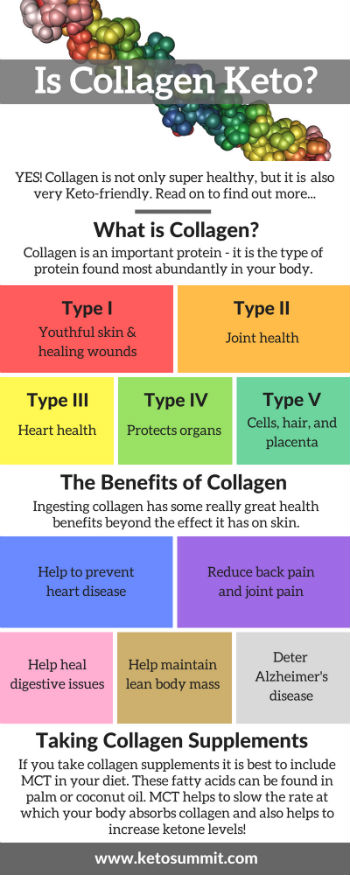Is Collagen Keto?
Collagen has been popping up seemingly everywhere and in everything these days.
You’ve probably seen it advertised in lotions, body washes, and beauty supplies, in vitamins and supplements, and more recently in a lot of food choices on the shelves in the grocery store.
We’ll look today at whether or not collagen is Keto but before that, what exactly is it?

What Is Collagen?
Well, collagen is an important protein in your body. In fact, it is the type of protein found most abundantly in your body. (1) Collagen can be found in your digestive system, your muscles and tendons, your bones and skin, and even in your blood vessels.
Collagen has several key roles to perform. It helps your skin stay supple and strong as you age, and it helps your body replace dead skin cells with fresh new ones. This particular function explains its popularity in the night cream and facial care aisle.
Also, collagen is quite literally responsible for keeping us from falling apart as we age. Collagen is the glue that keeps our muscles, joints, and tendons functioning as they should.
Registered Dietician Brigitte Zeitlin, RD, CDN, says, “While we make out own collagen, we make less and less as we age and things like sun exposure, diet, and stress can deplete it even more.”
In fact, as you age, your body begins to slack on producing the collagen you need. This is one reason that wrinkles form and joints become stiff and painful.
Our ancestors used to eat diets that contained plenty of collagen, but the tendency is not to eat that way anymore. People nowadays get squeamish at the thought of eating too much animal skin and tendons. (2)
Because of this, it’s a smart move to supplement your diet with collagen.
There are 28 different types of collagen that we know about. (3) Among these, 5 are most common…
- Collagen Type I can be found in your tendons, skin, bones, and connective tissue. Type I collagen is important for the youthful appearance of skin, helping wounds to heal, and holding tissue together.
- Collagen Type II is found in your cartilage. This collagen is important for joint health, as cartilage is found in your joints.
- Collagen Type III is found in muscles, organs, and arteries. Type III collagen is very important for heart health.
- Collagen Type IV is found in your basal lamina. This is the thin gel-like layer of cells that surrounds your organs and protects them.
- Collagen Type V is found in the cells, in hair and in the placentas of women.

Contrary to popular belief, all the collagen-infused lotion in the world is not going to make an actual difference in your skin. To be properly absorbed and utilized by your body, collagen needs to be ingested.
Benefits of Collagen
Though the most commonly known benefit of collagen is the role it can play in the look and feel of skin, there is some other tricks collagen performs that can be far more beneficial.
1) Collagen can help prevent heart disease. (4) After consuming collagen twice a day, study participants had their serum lipid levels and arterial stiffness tracked by scientists.
After 6 months of this study, it was found that the participants experienced an impressive decline in their cholesterol ratio, and all participants had less arterial stiffness.
The scientists concluded that collagen can keep your arteries and blood vessels malleable. This is important as stiff blood vessels and arteries have been found to increase your chance of strokes and heart attacks.
2) Collagen can reduce back pain and joint pain. Dr. Amy Myers, M.D. notes, “Collagen contains the amino acids glycine and proline, which can aid in reducing joint pain and help to increase joint mobility because of their anti-inflammatory properties, similar to those of ibuprofen.” Listen to our podcast with Juliet Starrett on the importance of mobility!
Researchers have determined that collagen can be a great tool in relieving people of their back, neck and joint pain. In one study, scientists found that after 6 months of taking collagen on a daily basis, a statistically significant portion of the participants had marked improvement in their back or joint pain. (5)
In another study, scientists found that participants who experienced joint pain at the beginning of the study had a noticeable reduction in pain by the end of the study. After taking a daily dose of collagen, the study participants had less pain during all activities. (6)
3) Collagen can help heal digestive issues. Many people experience distressing or painful digestive problems such as bloating, constipation, gas, or diarrhea. These conditions are not just unpleasant – they can signal injury or inflammation in the intestinal tract.

Researchers have found that people with Inflammatory Bowel Disease tend to have low collagen levels. (7) It appears that consuming collagen in any form can help heal digestive problems, promoting better overall health. (8)
4) Collagen can help maintain lean body mass. Since it is a protein found heavily in muscle tissue, it should come as no shock that collagen is crucial for muscle maintenance. “Between 1–10% of muscle tissue is composed of collagen. This protein is necessary to keep your muscles strong and functioning properly,” according to Registered Dietitian Brianna Elliott, RD.
In a 12-week study, researchers found that men who did resistance training and took a collagen supplement experienced an increase in muscle strength as well as fat loss. (9) Supplementing with collagen and staying active could help you to maintain a healthy body well into your golden years.
5) Collagen could help protect your brain from Alzheimer’s disease. We still have plenty to learn about Alzheimer’s, but scientists have been making some promising discoveries in recent years.
In addition to muscles and cartilage being full of collagen, scientists have found that collagen is also found in the nerve cells of the brain (neurons).
Collagen may help create a protective barrier for the neurons, blocking them from the amyloid plaques associated with Alzheimer’s disease. (10) More research is needed in this area, but this study suggests that collagen may play an important role in the long-term health of the brain.
Do You Need to Add MCT to Collagen on Keto?
Medium chain triglycerides or MCTs are fatty acids that can be found naturally in some oils, specifically palm oil and coconut oil.
MCTs have long been known to increase ketone production, a primary goal when you’re following the Keto diet. (11)
Using MCTs along with collagen supplementation will help slow the rate at which your body absorbs the collagen protein. This allows your body to use that protein for recovery rather than turning it into glucose and knocking you out of ketosis.

Collagen vs Gelatin
It can be confusing trying to differentiate between collagen and gelatin. This is because they contain the same amino acids, and they are incredibly similar.
Gelatin is what you get when collagen is cooked. When gelatin is added to liquid it forms a gel, but collagen does not have this property.
Both serve as a high-quality source of protein and are beneficial for your body, but collagen is easier on the digestive system.
You can cook with gelatin and reap some benefits, but for everyday use, collagen is a wiser bet.
Will Collagen Kick You Out of Ketosis?
Some people fear that taking a collagen supplement will knock them out of ketosis because collagen is a protein. If you’re concerned about this, pair your collagen with MCTs to slow the protein absorption.
Also, remember that you’re doing Keto to get healthier! If your goal is to lose weight, get clearer skin, lusher hair – collagen helps you achieve those benefits. Go for results rather than a number on your ketone meter.
Best Brand of Keto Collagen to Buy
The best collagen supplement you can buy comes from CoBionic.
CoBionic has formulated their collagen to be just what Keto dieters need from their collagen supplementation.
- It comes from grass-fed cows
- It’s combined with 6 other superfoods to help you feel and look younger
- It contains only non-inflammatory ingredients. No dairy, no gluten, no sugar, and no added fillers or colors.
Is Collagen Keto?
Collagen is not only super-healthy, but also very Keto-friendly.
While collagen is a little protein-rich, following the Keto diet is about far more than just tracking macros.
Collagen will help you achieve the larger Keto goals of overall health, weight loss, and having clear skin and joints that don’t ache with every movement.
As long as you keep an eye on your protein intake, collagen aligns perfectly with Keto, so embrace this powerful protein while boosting your overall health.
Pinterest Image For Is Collagen Keto?
Please pin the image below so that you and others can quickly and easily refer to the list and find out more about wonder-protein collagen!

